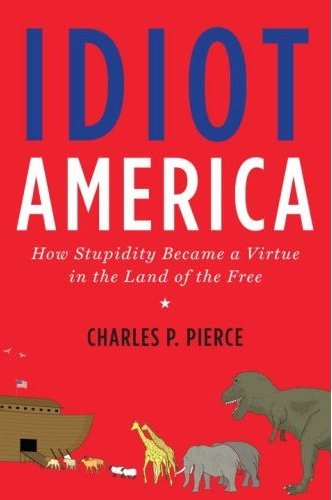
Idiot America: How Stupidity Became a Virtue in the Land of the Free
by Charles P. Pierce
-Reviewed by Monica Barra
When fringe opinions are louder than reasonable ones, and seem ready to overwhelm Americans’ ability to understand what’s happening in the world, consider it a cost of free speech.
Charles Pierce makes precisely this case in his Idiot America, exploring with a keen eye and sense of humor how to understand and cope with the effect extremism has on society. Pierce offers a part historical, part elaborately critical take on idiocy in America. Tracing the history of stupidity back to its roots, Pierce’s book is a concerned, wry, and at times biting foray into the people – whom he calls “cranks” – in American history who have led to our contemporary state of ignorance.
Pierce credits the oft-overlooked Founding Father, James Madison, otherwise known as the “diminutive hypochondriac from Virginia,” with recognizing that liberty could have negative consequences. The founders unleashed upon a fairly trusting and compliant public the freedom to express new ideas, whether good or bad. Americans were the perfect audience for the crank. Cranks, as Pierce describes them, reside on the outskirts of the population, and care quite a lot more about having their voices heard and gaining popularity than educating the public. But they have shaped the country’s history, pursuing their role, to work in the “realm of the national imagination… to wander out of its borders and map its frontiers.” Whether or not they brought about good with their explorations, however, is still debatable.
The founding prince of cranks, Pierce says, was one Ignatius Donnelly. Beginning in the early 1800s, Donnelly invested his time in numerous, mostly failed, endeavors: real estate speculation in Minnesota; a political career during which he periodically changed parties to whatever benefitted him the most; and historical studies, his greatest triumph, culminating in a quasi-historical book on the lost city of Atlantis. His repeated failure to gain respect and success from his work only fueled his belief that “he was a genius for whom the world was not yet ready.” If one idea failed, he would try another. He was constantly at odds with a fickle public that wavered between admiration and criticism of his works.
But cranks haven’t been the same since Donnelly, Pierce notes. Cranks of that era might have raged against their dismissive audiences, but they were ultimately content to retreat to the periphery and conjure new schemes. The cranks imagined that while everyone was crazy and unstable, they resided on intellectually higher ground. Today, Pierce shows that cranks have a more intimate and playful relationship with the public. Using media and mass communication, and thanks to easy and cheap access to the web, cranks now have almost limitless freedom to infiltrate the public imagination. Feigning expertise, Pierce notes, has become easier and more marketable.
With relatively unchecked access to the public, cranks have paved the way for stupidity to flourish in America. Giving an ear to individuals and groups on the fringe, Pierce argues, has little by little taken us away from rational and sound thinking, with a real impact on the way the country works. Pierce considers the fallout from a lone man’s attack on the Flight 93 Memorial in Pennsylvania. After deciding on a design, following months of public meetings and a far-ranging competition, one blogger claimed that the memorial had been deliberately designed in the shape of a crescent, pointing towards Mecca, and counted the terrorists among those memorialized in the design. With a hat-tip to 9/11 conspiracy theorists, he mounted a campaign attacking the memorial’s architects, claiming that they had built a memorial to Islam and not the flight victims. Public outcry eventually forced the architect to straighten out the crescent into a semicircle, appeasing the vocal minority.
Pierce unleashes story after story to drive home his conviction that Americans, swayed by various fringe groups and individuals, have dug themselves too deep into idiocy to find a way out. Even the 2008 election, which saw both candidates, and, Pierce argues, particularly Barack Obama, distancing themselves from and criticizing cranks, didn’t lead to a moment of clarity: “Obama’s rise to the Democratic nomination on a nebulous concept of ‘change’ seemed to be based, at least in part, on the idea that we would all stop conning ourselves. But no.”
Pierce’s book is, as he puts it, a tirade, the result of spending years as a journalist watching, he says, intelligence unravel in the United States. As Pierce observes, “the words of an obscure biologist carry no more weight on the subject of biology than do the thunderations of some turkeyneck preacher out of the Church of Christ’s Own Parking Structure in DeLand, Florida.” It’s the American way.
Excerpt: Human beings are storytelling creatures. We structure reality in terms of narratives. In other words, we start at Point A and get to Point B, and everything in between is called hope. If you’re a human, you’re a storyteller, a story believer, and that’s just the way it is.
Further Reading: The Great Derangement: A Terrifying True Story of War, Politics, and Religion and The Dark Side: The Inside Story of How The War on Terror Turned into a War on American Ideals




Send A Letter To the Editors